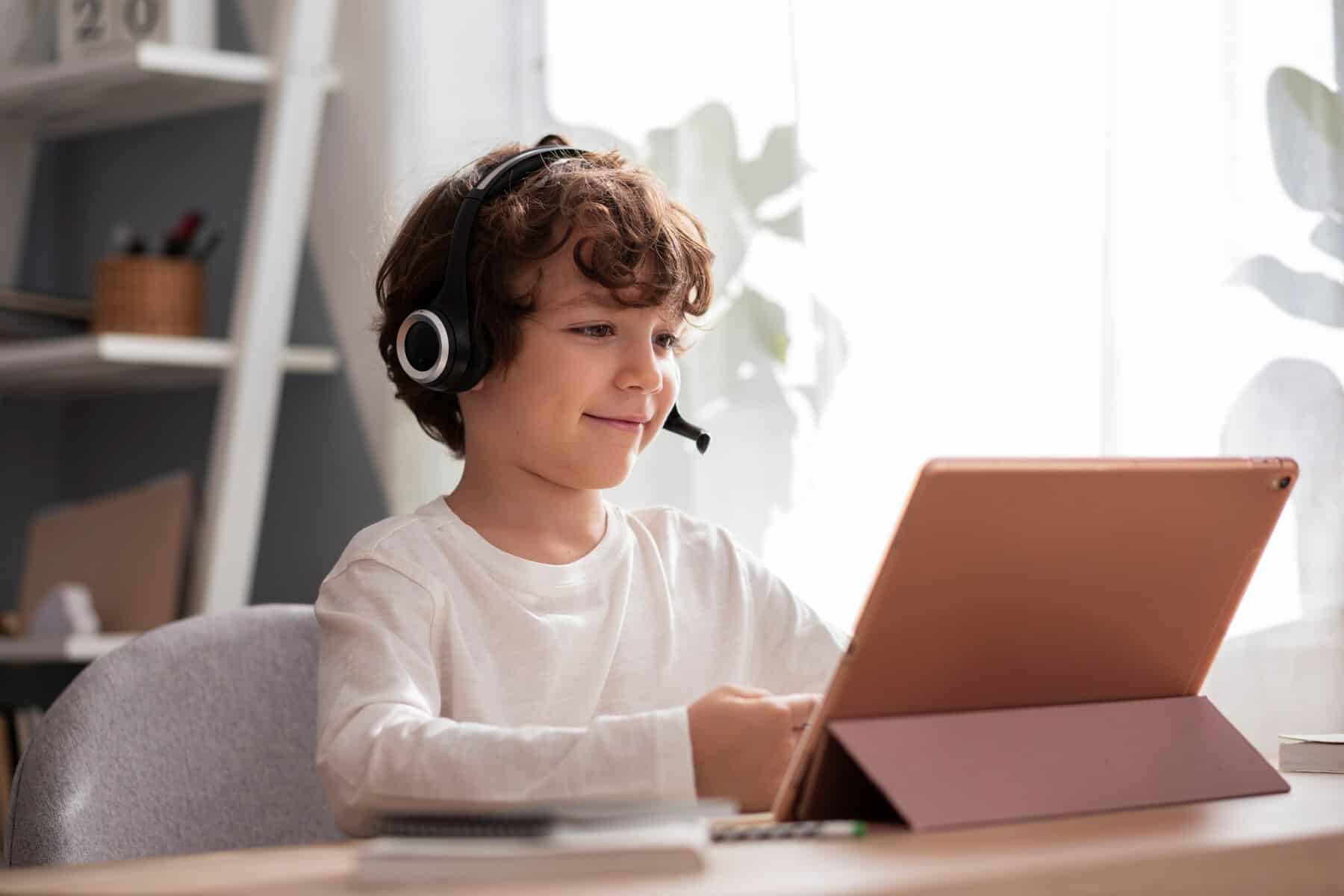
How Young Kids Can Benefit from Online Learning
Online learning is changing education. It used to focus on college and job training, but now it’s helping younger students too. Parents and teachers are looking for new ways to engage kids. Understanding how young kids can benefit from online learning is important. This blog will discuss the many advantages of e-learning for children. We will look at the best e-learning programs, tips on teaching kids online, and the role of interactive digital learning.

Key Benefits of Online Learning for Young Kids
Online learning has many benefits for young learners. Here’s why this type of education is great for children.
Flexibility and Accessibility
One major benefit of online learning is flexibility. Unlike traditional classrooms, e-learning lets kids learn at their own pace. This is great for young learners with different attention spans and speeds. Parents can set learning schedules that fit their child’s needs, making education part of daily life.
Personalised Learning Experience
Online platforms often use algorithms to tailor learning for each child. By looking at a child’s progress, these platforms can adjust lessons to fit their strengths and weaknesses. This personalised approach improves learning and helps kids feel motivated.
Engaging and Interactive Content
Interactive digital learning is key to effective online education. E-learning programs use videos, animations, and quizzes to make learning exciting. This fun content grabs children’s attention and encourages them to participate actively.
Development of Digital Literacy
In today’s digital world, kids must learn digital skills early. Online learning helps children get comfortable with technology. As they use e-learning platforms, they learn skills like typing, researching online, and digital communication. These skills are important for their future.
Exposure to Diverse Perspectives
Online learning connects kids with peers and teachers worldwide. This helps them learn about different cultures and perspectives. It fosters empathy and open-mindedness and offers access to a variety of educational resources beyond a traditional classroom.
How to Teach Children Online: A Step-by-Step Guide
Teaching young kids online needs a careful approach. Here’s a step-by-step guide for parents and teachers.
Step 1: Choose the Right E-Learning Program
Start by picking the best e-learning programs for kids. Look for platforms with age-appropriate content and interactive features. Choose programs that match your child’s interests and learning goals for a balanced educational experience.
Step 2: Create a Structured Learning Environment
A structured learning space is vital for focus. Set up a quiet, comfortable area free from distractions. Establish clear routines for lessons, breaks, and activities. Consistency helps create a productive online learning space.
Step 3: Incorporate Interactive and Hands-On Activities
To keep kids engaged, add interactive and hands-on activities. Use digital tools like virtual whiteboards and educational games for immersive learning. Encourage kids to ask questions and collaborate with peers.
Step 4: Foster Communication and Collaboration
Good communication is key for online learning. Encourage kids to talk with teachers and classmates. Use video conferencing for discussions and group work. Give children chances to share ideas and ask questions.
Step 5: Monitor Progress and Provide Feedback
Regularly check your child’s progress and give helpful feedback. Use online tools to track performance and identify areas for improvement. Celebrate achievements to boost motivation. Feedback should be timely and focused on growth.

Additional Expert Tips & Common Mistakes to Avoid
While online learning is beneficial, it’s crucial to avoid common pitfalls. Here are some expert tips and mistakes to watch for.
Expert Tips
- Incorporate Varied Learning Modalities: Use visual, auditory, and kinesthetic activities to address different learning styles. This variety keeps kids engaged.
- Encourage Self-Directed Learning: Motivate kids to explore their interests and set learning goals. This independence builds critical thinking.
- Integrate Real-World Connections: Connect online lessons to real-life situations to make learning meaningful. Use everyday examples to illustrate concepts.
Common Mistakes to Avoid
- Overloading with Screen Time: Too much screen time can lead to fatigue. Balance online learning with offline activities like reading or outdoor play.
- Neglecting Social Interaction: Online learning shouldn’t replace social time. Encourage kids to engage with friends through virtual playdates or group projects.
- Ignoring Individual Needs: Avoid a one-size-fits-all approach. Adjust learning to fit each child’s unique needs and pace.
Advanced Insights and Expert Recommendations
As online learning evolves, staying updated on trends is essential. Here are some insights for optimising online learning for kids.
Embrace Gamification
Gamification can boost engagement in online learning. Adding game-like elements like rewards and challenges makes learning fun and competitive.
Leverage Artificial Intelligence
AI is changing online learning. AI platforms can analyze student data to give personalized recommendations and learning paths. This helps educators provide tailored instruction for each child.
Promote Digital Citizenship
As kids learn online, teaching them about digital citizenship is crucial. Discuss responsible online behaviour, internet safety, and protecting personal information. Encourage ethical decision-making in the digital space.

Conclusion: Unlocking Potential Through Online Learning
Online learning offers young kids a flexible, personalised, and engaging experience. By using the best online learning programs and effective teaching strategies, parents and educators can unlock its full benefits. Embracing new technologies and fostering digital literacy will prepare young learners for a digital future.
Are you ready to start online learning with your child? Explore the best e-learning programs for kids and see how interactive digital learning can change their education. Share your thoughts and experiences in the comments!